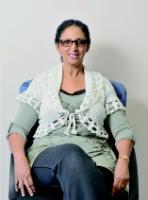
Founding member and first chairperson of the Women’s Academic Solidarity Forum (WASA) Dr Darlene Miller argued that women contesting the command of patriarchy need power, but must be careful to wield that power differently if they are to fight for the good of society.
She was speaking during WASA’s 10th anniversary celebrations held on 19 March 2014. Her keynote speech entitled “Women’s Leadership: A Useful/Useless concept in Post-Apartheid South Africa”.
“WASA is a scream,” Dr Miller stated. “The scream is the growing awareness that comes to us as professional intellectuals, that dawns on us that all is not as it should be.”
The general consensus was that despite the good work which the association has done in the past 10 years, there has still not been much progress in the number of women occupying senior academic positions in the University. Moreover, on a broader societal basis and approaching the election which marks 20 years of democracy, this lack of transformation is something the country is starting to question as well.
Thus the feeling of distress among women academics which precipitated the first founding of WASA continues to exist and so each year a small core of individuals comes together to raise their voices in solidarity.
“Unseating academic and cultural majorities aims to dislodge comfortable spaces of power and hence will have an unsettling effect on those in the cultural majority,” she said in explaining some of WASA’s aims.
In her address she traced a society history (or “her-story”) of how we as a society arrived at the present state of affairs. She looked to the influence of Margaret Thatcher in the institution of neoliberal economic policies, cited the mixed-blessing that is having “good fathers” who accumulate wealth and status while women care for the children and home.
She also identified the complicity of femocrats in maintaining patriarchal power structures. All this has led to a situation in which various forms of male rule remain dominant, even where ostensibly granted a female face.
By way of potential solution, Dr Miller argued for “womanist” rather than women’s leadership. “If masculanist leadership by men and women in the public arena has failed us, then we turn to womanist leadership,” she said.
Six principles underlie this alternative form of governance. Among these is the prioritisation of the collective over the individual, the retrieval of servant leadership, and the dispersion of power.
Rejecting the accumulation of power in a single individual or body, Dr Miller argued that leaders must be humble, versatile, and willing to share both status and responsibilities. She believes that this is a better form of leadership which women, by virtue of their socialisation, are predisposed to.
“My exhortation to you in the 21st Century is: listen to the women, young and old. But to be heard we have to move from the scream to the story and the song,” she concluded.
By Kyla Hazell
Caption: Dr Darlene Miller
Photo by: Mathieu Dasnois
